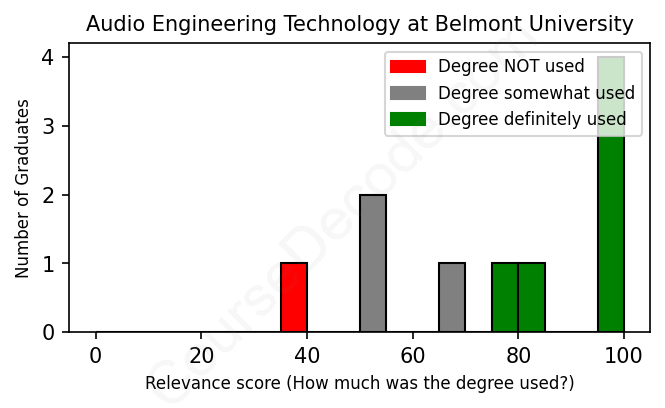
First, some facts. Of the Audio Engineering Technology graduates from Belmont University we've analyzed , here's how many have used (or NOT used) their degree in their career:

These are estimates based on AI analysis of 10 LinkedIn profiles (see below).
The verdict? Above average. Overall, with an average relevance score of 76%, Audio Engineering Technology graduates from Belmont University have a higher likelihood (+9%) of finding work in this field compared to the average graduate across all fields:
And for comparison, here's the chart for all profiles we've looked at across all degrees.
Also, after graduating, only 30% of these graduates have pursued further education other than another Bachelor's degree (such as a Masters degree or other), compared to the average across all profiles of 35%. This suggests a Bachelors degree is enough for most Audio Engineering Technology graduates, and it's normal to look for work straight after graduation.
See the details:
|
Relevance score: 100% We think this person has gone into a career highly relevant to their degree. We think this person has gone into a career highly relevant to their degree.
DEGREE INFOGraduated in 2019 from Belmont University with a Bachelor of Science - BS in Audio Engineering Technology. No other secondary education since. JOB HISTORY SINCE GRADUATIONOwner/ Founder- Blackwell Post Mar 2020 - Aug 2023 Sound Designer  Panoptic Games Jun 2023 - Present Sound Designer  The Pyramid Watch Sep 2023 - Present ABOUTI believe that excellence in financial management is a key factor in supporting the company's success, and I am constantly striving to ensure that the company achieves optimal performance in financial terms. I look forward to networking with peers, partners and professionals, sharing experiences and discussing best practices in the finance space in order to collectively advance the industry and the organization |
The top 10 most common jobs done by the graduates we've analyzed (ranked most common to least) are:
After looking through the career paths of graduates from the Audio Engineering Technology program at Belmont University, it’s clear that a significant number of them have pursued jobs that are directly related to audio engineering. Many alumni have taken on roles like Audio Engineers, Sound Designers, and Freelance Sound Engineers, which not only align well with their degree but also actively utilize the specialized skills they developed during their studies. For instance, working for notable clients and organizations in live sound, studio environments, or even in gaming and film illustrates a strong connection between their education and professional lives.
However, not every graduate has stuck with a career strictly in audio engineering. Some have ventured into unrelated fields like IT or law enforcement, where their audio engineering background might not come into play at all. Positions such as Dock Master or some technical roles seem to have a lighter relevance to audio engineering, indicating that while their degree provides a cool foundation, not everyone is directly using those audio skills in their daily work. Overall, many of the graduates have found ways to keep closely tied to the audio engineering world, though there’s a noticeable mix of relevant and less relevant career moves happening. It’s like any degree—some folks stick with what they studied, while others explore different paths!
Here is a visual representation of the most common words in job titles for Audio Engineering Technology graduates (this is across all Audio Engineering Technology graduates we've analyzed, not just those who went to Belmont University):

Looking at the career trajectories of graduates from Belmont University's Audio Engineering Technology program, it's clear that many of them initially find their footing in hands-on roles like internships or entry-level positions within the audio industry. For instance, graduates from 2013 started as interns in prominent studios, before moving on to roles like assistant mix engineer, and some even went on to freelance gigs. Several graduates seem to stick with audio-related jobs, such as sound engineers or technical supervisors, suggesting a strong connection to their field of study right out of the gate. Others, however, have taken some detours toward careers that are not directly related to audio engineering, like those who ended up in roles as police officers or tech jobs outside of audio.
As time goes on—around five or ten years post-graduation—the trends show a mix of excitement and unpredictability. While some graduates continue to thrive in audio positions, others veer off into various fields, indicating that career paths can be quite varied. Graduates who have been out for a decade or more tend to have carved out solid niches for themselves in the music or audio tech industry, often climbing the ranks and assuming significant responsibilities, such as running their own companies or contributing creatively as sound designers. Meanwhile, those who took other routes demonstrate that a degree in Audio Engineering Technology can lead to different, sometimes surprising, career shifts. Overall, it seems like a decent number of these grads are working in relevant jobs, but there's also a fair share navigating other fields entirely.
Getting a Bachelor’s degree in Audio Engineering Technology at Belmont University can be a bit of a mixed bag, depending on your background and passion for the subject. If you’re someone who really loves music and has a knack for technology, you might find the coursework enjoyable and relatively manageable. You're gonna dive into everything from sound design to mixing techniques, and that can be a lot of fun. However, it does require a solid commitment to learning some technical stuff, like recording techniques and signal flow, which can be a challenge if you’re not into the nitty-gritty details. Overall, I’d say it's more on the demanding side compared to some other degrees, especially if you want to really excel and get hands-on experience. But if you’re passionate about audio and willing to put in the effort, you’ll probably find it rewarding!
Most commonly, in the LinkedIn profiles we've looked at, it takes people 4 years to finish a Bachelor degree in Audio Engineering Technology.
Looking at these graduates from Belmont University, it seems like they've racked up a pretty mixed bag when it comes to career trajectories and money. On one hand, you have folks like the 2010 graduate who’s been an audio engineer for a long time at a well-known touring company, which probably pays decently. On the other hand, some of the more recent grads are still in entry-level gigs or internships, which usually means not so great pay. We see some interesting moves into other fields, like a police officer and network administrator, which suggests that the music industry can be a tough nut to crack financially. Overall, while some may be doing well, others are definitely still working their way up the ladder, so it looks like the money situation isn't all that consistent across the board.
Here is a visual representation of the most common words seen in the "about" section of LinkedIn profiles who have a Bachelor degree in Audio Engineering Technology (this is across all Audio Engineering Technology graduates we've analyzed, not just those who went to Belmont University). This may or may not be useful:

Here are all colleges offering a Bachelor degree in Audio Engineering Technology (ordered by the average relevance score of their Audio Engineering Technology graduates, best to worst) where we have analyzed at least 10 of their graduates:
| College | Score | Count |
|---|---|---|
 Belmont University Belmont University
|
76 | 10 |